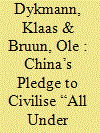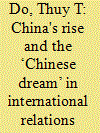|
|
|
Sort Order |
|
|
|
Items / Page
|
|
|
|
|
|
|
| Srl | Item |
| 1 |
ID:
182950


|
|
|
|
|
| Summary/Abstract |
With China’s global rise, both its state leadership and key academics have engaged in developing a civilisational discourse for the twenty-first century partly based on ancient cosmological concepts. This article explores the meanings of and intentions behind this discourse, including its promise of a Chinese-led world order, and discusses its intended audience and international appeal. In the backdrop of theoretical debates on empires and their missions, the article claims that without a corresponding cultural appeal, China’s rising economic power and geostrategic clout are insufficient conditions to realise an empire in the classical sense. Growing inconsistencies mar the country’s imperial ambitions, such as those between a global civilising outreach and a toughening domestic embrace. Instead, imperial rhetoric is cautiously integrated in the party-state’s restoration of a Chinese “empire within,” indicating self-centredness and a lurking re-traditionalising of Chinese state power.
|
|
|
|
|
|
|
|
|
|
|
|
|
|
|
|
| 2 |
ID:
142021


|
|
|
|
|
| Summary/Abstract |
The rise of China/East Asia and the perceived decline of the US/West pose an emerging question about how international relations (IR) theory should respond to this change. Increasingly, there have been heated discussions among Chinese IR academics over a desirable Chinese contribution to IR theory (IRT), particularly the possibility of building a distinctive Chinese IRT. Inevitably, this drive towards theorizing from a Chinese perspective also creates a backlash among not only Western but also other Chinese scholars as they question the ‘nationalistic’ if not ‘hegemonic’ discourse of the scholarship. Drawing on the sociology of scientific knowledge framework, this article examines the linkages between the vibrant dynamics of the Chinese theoretical debates and the actual practices of Chinese scholars in realizing their claims. It suggests that this investigation can serve as a springboard into a better appreciation of the theory–practice and power–knowledge relationships in the context of Chinese IR.
|
|
|
|
|
|
|
|
|
|
|
|
|
|
|
|
| 3 |
ID:
174809


|
|
|
|
|
| Summary/Abstract |
This study of the historical Chinese cases is an engagement with the ongoing debates on the Chinese view of international order and the prospect of Beijing’s supersize project like the Belt and Road Initiative. The overarching idea of this paper is to locate and contemplate the similar dynamics of an ethnically diverse Asia in the sixth, and the seventeenth century, and the continued feature about how various Chinese regimes managed it. Four historical types of international orders (Tianxia) China perceived are accordingly constructed. It argues, as the current internal order is partially challenged by China’s rise, that either the future order or the Chinese ethnic policy will be a mixed one resembling my historical types. A purified Westphalian ‘myth’ and the modern order based on it may be reaching its end, as we are envisaging.
|
|
|
|
|
|
|
|
|
|
|
|
|
|
|
|
| 4 |
ID:
187536


|
|
|
|
|
| Summary/Abstract |
The literature on International Relations theory has yet to align relational theory with role theory, despite the fact that these two theories share so much epistemological common ground. This article uses role theory to bridge the gap between the Confucian and Western conceptions of relationality, whose practitioners regard each other as strangers. With the support of role theory, the comparative analysis of relationality in this article has mainly focused on two different types of relations: prior rule-based relations and improvised relations. The differences in the cultural preparation for these two relations partially explain the plurality of the relational universe and the perception of stranger. Role theory is one way to reconnect the seemingly irreconcilable relational universes. To illustrate the value of a composite agenda of relational theory and role theory, the article will use Kim Jong-un of North Korea as its case. Confucian relations propose that, for all nations, the necessity of having a certain role relation is a more important agenda than insisting on exactly what role to take.
|
|
|
|
|
|
|
|
|
|
|
|
|
|
|
|
| 5 |
ID:
189895


|
|
|
|
|
| Summary/Abstract |
This article argues that there are important similarities between Zhao Tingyang's conception of tianxia and the decolonized, post-racial world envisioned by decolonial thinkers of the global south. Defined in terms of "internalization," "relationality" and "amelioration," the logic of tianxia that Zhao describes is comparable to the vision of a non-racialized world order of mutual, cultural synthesis of which decolonial thinkers have also spoken. Understanding tianxia in this way also allows us to better articulate the nature of "Chinese-ness." Traditionally China or "huaxia" was identified with civilization per se and Civilization as "huaxia" was not defined through ethnicity and so not the preserve of any one group of people. Under this understanding of "huaxia," to be(come) "Chinese" is merely to be civilized and civilization, in turn, is the ability to embrace the world in its totality. This paper expands on Zhao's definition of tianxia by arguing that culture (wen) should also be included as a non-reducible component of tianxia. This article ultimately argues that being "Chinese" should mean the ability to embrace and actively synthesize world cultures. This is the true meaning of "huaxia," a meaning that overlaps with important strands of decolonialism, and thus has more universal significance.
|
|
|
|
|
|
|
|
|
|
|
|
|
|
|
|
|
|
|
|
|